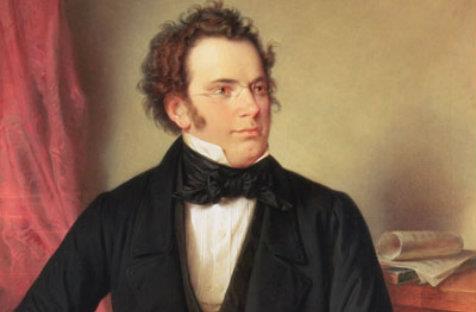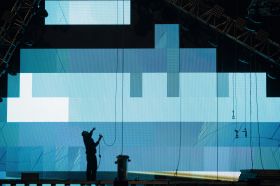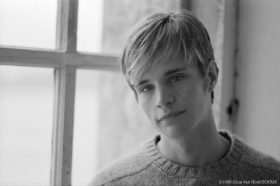I like an ensemble that stands up. I think I like the idea that maybe, just maybe, during those long pieces that aren’t all that exciting, perhaps the musicians might be feeling as sore as we, as audience members in our less than ideal seats, can sometimes get. Also, and much more importantly, one gets a heightened sense of dynamism. Violinists, for instance, get a few extra gestures to add to their repertoire of showmanship techniques, including the ever present knee-bend for when they’re really feeling the music. (Another example would be the step-forward into the start of a phrase, when they want to add more emphasis.) Live music has a visual aspect to it that many people overlook, I think; these things are more important than a perfunctory glance would make them seem.
Not that all of that helped the Haydn. The concert began with Haydn’s String Quartet in D major op 64 no 5 (Hob.III:63), Lark, and while well played, the piece didn’t grab one’s attention as much as one would have liked. First violinist Kristian Winther didn’t sound as if he were choosing the notes then and there quite so much as he has before, though there were occasional moments of it. Winther has a sort of understated charisma on stage; he is a combination of virtuosity and innocent nonchalance, like giving a child a basketball and watching him shoot hoop after hoop without thinking it strange that he makes the shot every time. The Haydn was entertaining, yes, but it didn’t leave one with that post-piece buzz that the great performances do.
All that changed with the Bartok, though. His String Quartet no 3, Sz 85 shared the first prize of a competition run by the Musical Fund Society of Philadelphia and it’s easy to see why. It is a single movement work that begins slow, gets fast, slows down then gets fast again; once one has entered Bartok’s world (it took this critic about half a minute before he was fully absorbed) he doesn’t let you go. The program tells us (and anyone watching the musicians would see) that the quartet employs a ‘range of “extended techniques” which were to become the staple of later twentieth century music, among them sliding glissandos; bowing with the wood, rather than hair of the bow; [and] bowing at the bridge to produce an eerie sound or above the fingerboard to produce a much paler tone’. It also calls for many a loud note as well, and by the end of the piece Winther in particular had plucked off so many broken hairs from his bow that one suspects a small wig could have been made from the pile gathered on the floor. The piece as a whole was exciting, highly charged, and an ever-engaging pleasure. (It reminds one of the Shostakovich piano quintet which the Australian String Quartet so expertly performed last year; there was the same sense of aggressive vitality.)
After the interval came the juggernaut that is Schubert’s Quintet in C major for two violins, viola and two cellos D 956. Timo-Veikko Valve was the guest cellist for the evening, on loan from the Australian Chamber Orchestra, promised, one assumes, to be handed back to the ACO after the tour in the same great condition as they got him. (One suddenly has the frivolous idea of whether there’s any sort of chain-of-custody for musicians on loan.) The piece itself runs for about 50 minutes, and if not played well, can become a slight endurance test for an audience. The first movement, for instance, felt too long, and this critic, given the option of who to blame (the players or Schubert) is going to choose the players; they didn’t quite pull through the possible morass as well as one would have liked. The second movement, however – the Adagio – was sublime. The third movement wasn’t the best as one has heard, but the fourth was back into the heights once more. (In Sydney this past week or two, it has been the slower movements that have been proving themselves, interestingly enough.)
Anne Horton and Rachael Johnston (second violinist and cellist respectively) have chosen to leave the Australian String Quartet at the end of this tour, and player changes are always somewhat of a worry to the concerned audience member. But with the strength of Winther (and the talent of violist Stephen King) one imagines that there’s not much to fret.
Rating: 4 stars out of 5
Schubert
Australian String Quartet
Kristian Winther (violin), Anne Horton (violin), Stephen King (viola), Rachel Johnston (cello), Timo-Veikko Valve (cello)
Joseph Haydn – String Quartet in D major op 64 no 5, Lark
Bela Bartok – String Quartet no 3
Franz Schubert – String Quintet in C major D956
City Recital Hall, Sydney
4 June





